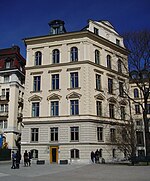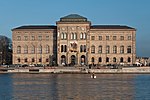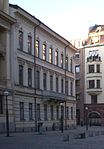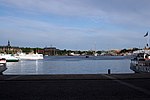Blasieholmen Church
1868 establishments in SwedenChurches completed in 1868Churches in StockholmSwedish church stubs

Blasieholmen Church (Swedish: Blasieholmskyrkan) was a Lutheran church at Blasieholmen in Stockholm built in 1867 and inaugurated with a church service on 12 January 1868. It was demolished in 1964. It was built on initiative from the priest Gustaf Emanuel Beskow.
Excerpt from the Wikipedia article Blasieholmen Church (License: CC BY-SA 3.0, Authors, Images).Blasieholmen Church
Blasieholmsgatan, Stockholm Norrmalm (Norrmalms stadsdelsområde)
Geographical coordinates (GPS) Address Nearby Places Show on map
Geographical coordinates (GPS)
| Latitude | Longitude |
|---|---|
| N 59.3299 ° | E 18.0766 ° |
Address
Elaine
Blasieholmsgatan
111 48 Stockholm, Norrmalm (Norrmalms stadsdelsområde)
Sweden
Open on Google Maps











